- Home
- Alexandra Bracken
The Darkest Minds: In Time Page 7
The Darkest Minds: In Time Read online
Page 7
Which is…where, exactly? California, I think. If she expects me to drive her all the way out to Southern California, she has another think coming.
“I’ll be right back,” I tell them. “Lock the doors, okay? And stay down.”
I pick up the receiver gingerly, wiping down the mouthpiece against my shirt, like that’s going to help. I pop in the dollar in change and dial the number Bryson wrote out on the back of my hand. It takes a moment for the call to click through to the tone; I glance back over my shoulder, making sure they aren’t peeking over the dashboard to watch when I specifically told them not to.
It rings three times, and just when I’m sure I’m going to be kicked to voice mail, a breathless voice answers.
“Um, yeah, hi, I think I…” Oh, shit. Does Gray still have his cronies listen in on calls? I mean, would they have any reason to listen in on this particular house’s calls? “I think I found your, um, stray…ra-dog.”
Shit, I almost said rabbit. Be cool, Gabe.
The woman—Della, I’m assuming—is silent.
“I’m happy to drop him off, but maybe it would be, um, better for you to come get him? He is a big dog. Nice…uh, reddish fur? Do you know which one I’m talking about?”
“Yes,” she says, her voice soft. She’s Southern—unexpected. “Can you tell me where you are? I’d be happy to meet you.”
I lean back out of the booth, trying to see the nearest street name. Sweat is pouring down my back, and not just because of the heat. “I’m grabbing dinner at Mr. Foo’s on Baseline and Priest Drive.”
“All right.” I can hear her keys rattle as she grabs them. “Okay, I’ll be there in less than a half hour. Do…do I need to bring anything with me? To thank you?”
“What do…” Oh. Oh. She’s asking if I need some kind of reward, I think. Crap. I mean…I guess I just assumed the only financial gain was in turning the kids in, not, you know, returning them. I’m so stunned I can’t think of a thing to say.
“Hello?”
“Some gas money would be great, I guess,” I manage to get out, “if that’s okay?”
I can’t really sort out my thoughts, even as I hang the phone up and make my way toward the car. The kids both turn and look at me, these little faces with big eyes, as I slide in and slam the door behind me. My forehead falls against the steering wheel as I lean into it, closing my eyes.
“Did you get Della?”
There’s a rustle of paper and faint scratching. I open one eye just in time to see Zu pass a note back to Bryson. It’s such a natural, typical thing for these kids to be doing in such a bizarre setting under such horrible circumstances that I have to smile, just a little bit.
“Zu wants to know if you need her to find us something to eat,” Bryson says, reading the paper.
I sit back, giving her an exasperated look of my own. “Della’s coming in a half hour. If you’re hungry, I can get whatever fifteen bucks will buy at Mr. Foo’s.”
They both shake their heads, and I realize, my exasperation blooming to a whole new level, that they’re worried about me being hungry. “I’m fine. We’ll wait until Della gets here.”
It’s my job to keep a lookout in the parking lot for her car or anyone or anything that could be suspicious—which in this day and age is pretty much everything, but this part of town is as dead as we could hope for. Out of boredom, I start fussing with the skip tracer’s tablet I swiped.
The home screen is a map of the United States that quickly zooms in on Arizona and then drops a red pin on the location of the PSF base in downtown Phoenix. A window pops up, letting me know it can’t connect to a local wireless network, but would I like to engage the satellite service for a small fee?
No. Hell no. That means someone on the other end can use that same connection to trace the location of the tablet.
What’s surprising, though, is that I can still use it without letting it hook up to the Internet. Maybe all the information is preloaded into the tablet, and you only need the Internet to download updates? That seems reasonable; the only thing spottier than the Internet these days is President Gray’s resume as leader of the free world.
The main menu is a series of buttons that range from GPS services, to a digital version of the handbook, to something called “Recovery Network.”
So this is what Hutch was going on about. After I tap the button with my finger, the screen changes, switching over to a list of names and pictures of kids. Most of the photos are kind of heartbreaking—they look terrified in them. The ones that are in camps have the red word RECOVERED across their photos. None of them list where the camps are, but in each profile is a kid’s basic information—approximate height and weight, hometown, parents’ names, whether or not the kid was turned in or “recovered.”
It’s curiosity, I’ll admit it. There’s a search bar at the top of the screen, so I type in Zu. I try not to glance down at her as the tablet loads the results. And, great, over three hundred names come up. It went through and picked out any kid who had zu in any part of their name, including a surprising number of Zuzanas and Zuriels.
But her name is Suzume. I know it the minute I see it, even though her doll-like face is framed by thick, glossy long hair. The tears hadn’t finished drying on her face when they’d taken the photo. She looked at the camera like the lens was the end of a gun waiting to fire.
Twelve years old, from Virginia. An only child.
At large, her listing says. Yellow. $30,000 reward for recovery. Highly dangerous, approach with caution. Then, because it’s all not horrible enough, it lists the date she escaped her “rehabilitation program” as being only four months ago. The number they gave her is 42245.
Below that is the field the skip tracers use to leave tips. There are two sightings reported in Ohio and one dated a few months ago, in late March, in Virginia.
A pounding between my ears starts at a low, uneven beat and races to a shattering pulse. Suddenly, I’m seeing two screens instead of one, and then they’re both blurring and I can feel my blood start to fizz beneath my skin, pounding at my temples. My whole body heats, like it’s being taken by a fever. I can’t breathe, I can’t breathe, I’m going to be sick.
They cut her hair short, I think.
She can’t talk, because of what they did to her, I think.
It was so bad there she had to escape, and every day she has to deal with assholes like me trying to send her back, I think.
Why did I never think this was a possibility? Not even once. I was so focused on turning her in I hadn’t even considered she’d already been inside, and what she’d found there had been horrible enough that she had to escape. And she did it. She got out. We both got out and we found each other, and maybe it wasn’t an accident after all. Maybe this is really what I was supposed to have been doing all along.
I want to ask her about it. I want to know the truth, even if I can’t hear her form the words. She can write it out for me, I don’t care. I want to hear what they did to her there—who did it to her—and I want to kill every single one of them. My mind is flashing with images of my friends. In their black uniforms, marching the kids up and down the halls. The crushed look she gave me when I forced her hands into those gloves and tied them together, like she was some kind of animal. More than anything I can’t stop thinking about the expression on her face watching that stupid movie in my motel room—the way it visibly lifted when Dorothy stepped out of that house and into the sweet dream of Oz.
Because she knows what it’s like to live in a world of black, and black, and the tiny bit of white, but when she escaped it, she didn’t find the rainbow of colors, the dresses, the singing, the dancing. She only found ugliness.
She only found me.
SIX
DELLA is younger than I expected, somehow. I guess I heard the words no kids and assumed that meant she was elderly, not someone who looks like she’s in her late forties. Her white sedan is the only car that pulls into the parking lot the whole t
ime we’re sitting there, so it’s impossible to miss her, even before she drives straight for us.
Bryson pops his head up just as she parks right beside the passenger door. We’re set as far back away from the storefronts as the parking lot will let us be, but I know we’re going to have to make this quick. At best, someone will see us and hopefully think we’re exchanging drugs or some other illegal substance, not kids.
She’s wearing blue jeans and a brown T-shirt and all it takes is seeing that head of fire-red hair for her guarded expression to fall. The lady still has her looks—a nice smile, a warm, open face. She doesn’t look wrung-out the way my mom did. She’s standing there, her aviator sunglasses on, her sunny blond hair curling around her shoulders, and she has her hands on her hips.
“I’m sorry, Miss Della” are the first words that come out of Bryson’s mouth when he opens the door. “I’m so, so sorry.”
She doesn’t look like the lecturing type, but I have a feeling if he were her flesh and blood, he’d be on the receiving end of some serious ass-whopping. Instead, she just cocks her head to the side, gives a faint smile, and opens her arms to him. Bryson goes willingly, burying his face in her shoulder. He basically collapses against her. I only relax when I realize the open door is blocking him from view.
“Y’all had some day, huh?” She lifts her sunglasses as she looks from Zu to me. “You’re younger than I expected!”
I laugh.
“I have a son about your age,” she continues, blue eyes inspecting me. “This feels like a stunt he’d pull, so you’ll have to excuse me—I’m trying to fight the urge to lecture you about taking big risks like this.”
Weird. Bryson said she didn’t have any kids.
I shrug. “No risk, no reward, right?”
Her smile falls just that tiny bit.
“Oh—no, I mean, no I don’t mean it like that,” I say quickly. “It’s just, the world, you know? Nothing changes if you don’t take a risk.”
“That also sounds like him,” she says dryly. “Do me a favor and save your mama the heartbreak of joining up with the Children’s League to see that particular thought through.”
Della is illegally harboring kids in her own home. Of course her kid joins an underground group that seems hell-bent on making Gray’s life miserable. It lights a fire at the back of my mind, burning through all the other vague possibilities I’d been slowly working through. I want to ask her more about it—more about her son—but she turns her attention to Zu, who, I swear, has not blinked once the entire time she’s been watching her.
“Hi, hon, how are you doing?”
She manages a shy smile that Della returns twice over.
“I have that gas money,” she starts, shifting her gaze back to me. “Where are y’all headed? Do you need a place to stay for the night?”
“We’re going to California,” I tell her, ignoring Zu’s surprised expression as she whips her head around. Of course we’re going now. “Her uncle has a ranch out there I’m bringing her to. Then I’m going to see if I can find some work.”
“You got your papers all in order? A plan to cross the border?”
And just like that, my heart’s in the pit of my stomach. “What do you mean?”
Della’s expression softens, but there’s something sharp working behind her eyes. “It’s the whole mess with the Federal Coalition and the League—they’re based out of Los Angeles, so Gray’s been tightening border security in the hope he can starve them out by not letting imports or exports through. You need special permission from the government to cross state lines.”
Well…shit. I press my lips together, trying to fight back the sting of disappointment. I’m sure there’s another way in that doesn’t involve driving. Or walking a couple of hundred miles through the desert in the summer.
“Do you need to get there soon? Would you have any way of getting the paperwork for it?”
“I mean…I guess we could…” My mind is fumbling for a way we could possibly sneak into California. On the back of a semi-truck? Could I bribe someone?
“Well.” Della drags the word out, running a hand back through her hair. “I guess you’re in luck, hon. A little bit in luck, at least. I have papers you can use, but they might be more of hindrance—and you’re going to have to figure out a way to hide her as you cross.”
“Wait—wait—what?”
Della smiles. “My husband, he’s a special kind of mechanic. He works for one of the companies that maintains the canals and aqueducts that bring water out of the state, so he has paperwork to cross state lines. I think they’re just in the dash.…”
Such is the force of Della that I don’t even remember getting out of the truck and walking around to meet her in front of the sedan. She points out the two special foil stickers affixed to the window. “I can’t give you these, unfortunately, but if you hit the border around midnight, they have fewer soldiers posted and they’re far more likely to be lazy and just wave you through. If not, show them these papers.…” She leans in through the open window, pops the glove box, and hands me a neat bundle of papers. “The company is on the auto-approvals list. If they ask for an ID to match against the name on the paperwork…well, you’ll have to get a little creative or say a little prayer and floor it.”
I swallow hard and nod.
Della puts a hand on my shoulder, smoothing out the front of my shirt like it’s the most natural thing in the world—but she catches herself and gives a rueful little laugh. “Force of habit, sorry. Two boys will do that to you.”
I didn’t mind it all that much. Honestly, it was kind of nice.
“Are you sure?” I ask quietly. “I mean…your husband, doesn’t he need the papers?”
She waves it off. “He’ll understand. Honestly. I want you to take this car and I want you to get that little girl someplace safe, okay? You understand that’s your job?”
I feel a little lightheaded at the weight that comes thundering down on my shoulders, but I nod. It is my job. I’m doing this.
“You’re up for it, aren’t you?” Della lifts her sunglasses again. “I know you are. I do. And you know how? Because you’ve made it this far. You called me, not the PSFs, not any of the skip tracers. There’s so much evil in this world, and you brought just that tiny bit of light back into it—not for the money or the credit or anything other than to help another human being out. And that’s rare, real rare. You’re a good man, and you should be proud of yourself.”
And it’s like when she says it, I do feel good. Genuinely good. I can’t remember the last time I felt so light. All the blood rushes to my face, but I’m not embarrassed. It’s just that my chest gets tight, and I have to hold my breath or else I’m going to burst out crying all over this stranger. I feel like if she touches me in that caring, simple way again, I’m going to explode into stardust.
And that’s when I realize it: not since Dad. No one’s told me something I’ve done is great or right or even worthy—and maybe it hasn’t been up until this moment. Before he took his life, he used to tell me that sometimes we don’t know what we’re looking for until we find it. I’ve been so angry, at him and at everyone else, that I don’t know how to handle the way I feel now. Because I think I might be happy. I think I might know what I’m supposed to be doing.
Bryson and Zu share a quick hug and he gives me this little fist bump before he climbs into the sedan, settling there like he belongs. I reach over to buckle my passenger in when she seems preoccupied with shaking the last bit of ink out of the dying pen I provided.
As Della gives me her directions for the fastest way to find the freeway and get to Southern California, I can see Zu frantically scribbling something down on that same sheet of notebook paper she and Bryson wrote their notes on the back of. I see the same handwritten message I caught a glimpse of before, only now I know Zu wasn’t the one to write it. The penmanship is too neat, too careful to be hers. When her arm moves, I can finally read the whole thing:
We love you. If you need help, look for my parents—they’re using the names Della and Jim Goodkind—and tell them I sent you.
I startle when Della reaches in to squeeze my shoulder and say good-bye. Zu looks up, panicked, and quickly folds the notebook paper up and leans over me to give it to her.
“Stay safe, honey,” Della says, blowing her a kiss, “the both of you, please.”
“I’ll do my best,” I tell her, shifting out of park. She steps back so I can roll the window up.
I don’t really know why I look in the rearview mirror as we drive away. I still feel a little bit like I’m walking through somebody else’s good dream, like none of this is real. And I know I won’t get the story out of Zu, not the full one, anyway. That’s okay. We’re allowed to have our secrets. Starting now, I’m leaving the past alone in the past.
Growing smaller and smaller in the reflection, Della unfolds the sheet of paper. But I see her when she presses her hand against her mouth, when she slumps against the side of the sedan—overcome, in relief, I don’t know. Zu’s message is only three words, but they nearly bring the lady with a spine like steel to her knees.
Liam is safe.
I think about stopping for the night—finding some cheap motel room along the way to California and trying to get a little bit of shut-eye to recharge, but I can’t bring myself to. After using Della’s money to fill the gas tank as much as I could, I’m left with the same fifteen dollars I had before. Any place charging that little for a room is the kind of place where we’ll wake up and find our car gone in the morning.
Zu keeps her eyes on the green freeway signs as we zoom past. By the way she keeps tapping her fingers against her leg, I think she’s counting them. We can’t keep a steady radio signal this far out in the desert, and I think the silence is starting to unravel some of her confidence. The lightness I felt earlier talking to Della is slowly bleeding away, too, into the dark, barren landscape around us. For the first time in my life, I miss the trees up north. I miss being surrounded by the known and familiar, and having it tucked in around me like a blanket.

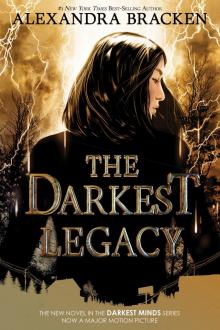 The Darkest Legacy
The Darkest Legacy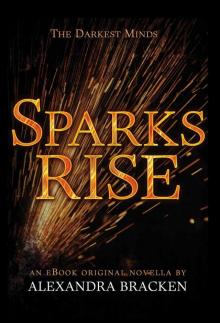 Sparks Rise
Sparks Rise The Darkest Minds
The Darkest Minds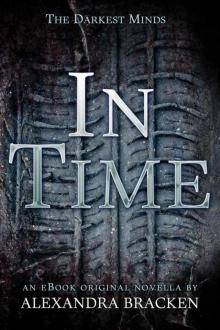 In Time
In Time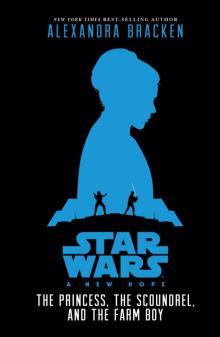 Star Wars: New Hope: The Princess, the Scoundrel, and the Farm Boy: Being the Story of Luke Skywalker, Darth Vader, and the Rise of the Rebellion (Novel)
Star Wars: New Hope: The Princess, the Scoundrel, and the Farm Boy: Being the Story of Luke Skywalker, Darth Vader, and the Rise of the Rebellion (Novel) Brightly Woven
Brightly Woven Wayfarer
Wayfarer In the Afterlight
In the Afterlight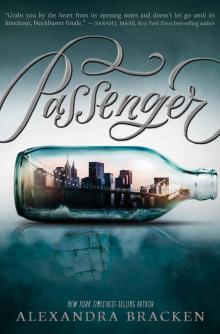 Passenger
Passenger Prosper Redding: The Last Life of Prince Alastor
Prosper Redding: The Last Life of Prince Alastor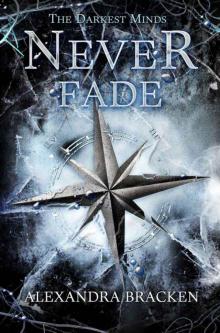 Never Fade
Never Fade Lore
Lore The Dreadful Tale of Prosper Redding
The Dreadful Tale of Prosper Redding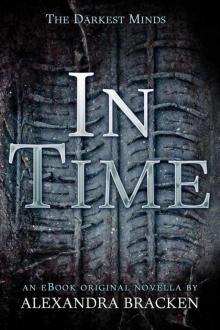 The Darkest Minds: In Time
The Darkest Minds: In Time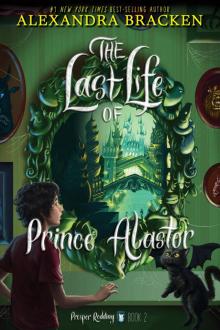 The Last Life of Prince Alastor
The Last Life of Prince Alastor In the Afterlight (The Darkest Minds series)
In the Afterlight (The Darkest Minds series)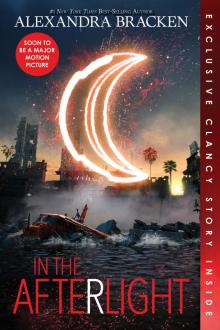 In the Afterlight (Bonus Content)
In the Afterlight (Bonus Content)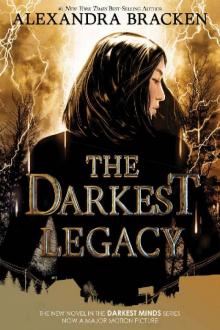 The Darkest Legacy (Darkest Minds Novel, A)
The Darkest Legacy (Darkest Minds Novel, A) Darkest Minds (1) The Darkest Minds
Darkest Minds (1) The Darkest Minds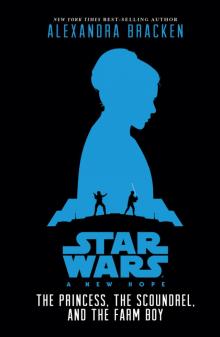 The Princess, the Scoundrel, and the Farm Boy
The Princess, the Scoundrel, and the Farm Boy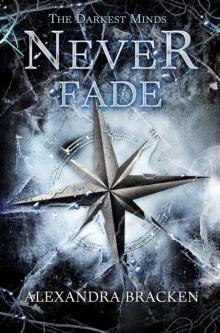 Never Fade tdm-2
Never Fade tdm-2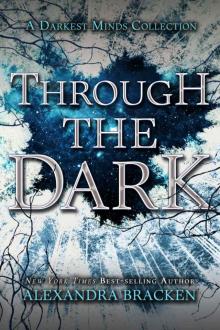 Through the Dark (A Darkest Minds Collection) (A Darkest Minds Novel)
Through the Dark (A Darkest Minds Collection) (A Darkest Minds Novel)